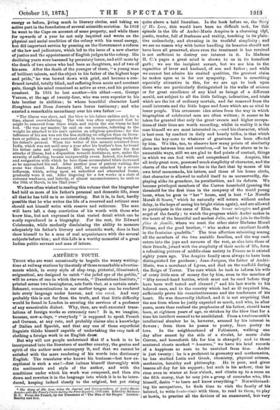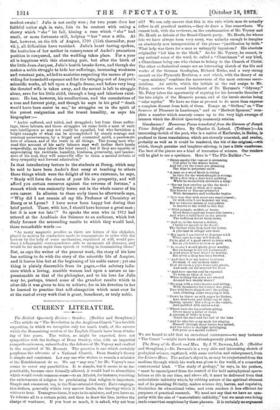AMPERE'S YOUTH.
THOSE who are wont occasionally to beguile the weary waiting- time at railway stations by the study of those remarkable advertise- ments which, in every style of clap-trap, pictorial, illuminated, enigmatical, are designed to catch "the jaded eye of the public," will be aware of one in which the words, "Translations Institute," printed across two hemispheres, sets forth that, at a certain estab- lishment, communications in our mother tongue can be rendered into every language under heaven, and vice versa. And very probably this is not far from the truth, and that little difficulty would be found in London in securing the services of a professor of any conceivable dialect. Why, then, are well-executed trans- lations of foreign works so extremely rare ? It is, we imagine, because, now-a-days, " everybody " is supposed to speak French and German, at any rate, and probably claims also a knowledge of Italian and Spanish, and that any one of these superficial linguists thinks himself capable of undertaking the easy task of clothing a foreign work in an English drat
But why will not people understand that if a book is to be incorporated into the literature of another country, the genius and spirit of the author must accompany it, and that we cannot be satisfied with the mere rendering of his words into dictionary English. The translator who knows his business—but how ex- ceptional is such a one !—first imbues himself thoroughly with the sentiments and style of the author, and with the conditions under which his work was composed, and then sits down and rewrites it in the language into which it is to be intro- duced, keeping indeed closely to the original, but yet rising
* The Story of His Love, being the Journal and Correspondence of Andre-Marie- Ampere with His Family Circle during the First Republic, 1793-1804. Edited by Madame B.C. From the French, by the Translator of "The Man of the People." London: Bentley and Son. quite above a bald literalism. In the book before us, the Sto- ry of His Love, this would have been no difficult task, for this' episode in the life of Andre-Marie Ampere is a charming idyl,' poetic, tender, full of freshness and reality, touching in its plain- tive melancholy, and elevating in its truthful simplicity ; and we see no reason why with better handling its beauties should not have been all preserved, since even the treatment it has received is not sufficient to destroy our interest in it. In Madame H. C.'s pages a great mind is shown to us in its homeliest garb ; we see the incipient savant, but we see him in the capacities of lover and husband, of son and father ; and while we cannot but admire his exalted qualities, the greatest claim he makes upon us is for our sympathy. There is something especially attractive in this, for we are apt to look upon those who are particularly distinguished in the walks of science or for great excellence of any kind as beings of a different mould, not subject to all the little failings, infirmities, and trials which are the lot of ordinary mortals, and far removed from the small interests and the little hopes and fears which are so vital to lesser people. This erroneous idea arises from the way in which biographies of celebrated men are often written ; it seems to be taken for granted that only the great•events and higher occupa- tions of their lives are worth recording, whilst in reality it is the man himself we are most interested in,—and his character, which is best seen by conduct in daily and hourly trifles, is that which gives the key-note to whatever of greatness has been effected by him. We like, too, to observe how many points of similarity there are between him and ourselves,—if he is far above us in in- numerable ways, still we are glad to find points of contact, things in which we can feel with and comprehend him. Ampere, like all truly great men, possessed much simplicity of character, and the charm of the work before us lies in the fact that by means of his own brief memoranda, his letters, and those of his home circle, that character is allowed to unfold itself to us unreservedly, dis- playing alike its grandeur, its peculiarities, and its defects. We become privileged members of the Carron household (passing the threshold for the first time in the company of the timid young lover, when he goes to " her " house, and is lent "Le Novelle Morali di Soave," which he naturally will return without undue delay, in the hope of seeing his bright vision again), and are allowed to participate in the cares of Elise, the bonne menagere and good angel of the family ; to watch the progress which Andre makes in the heart of the beautiful and modest Julie, and to join in the little fetes de famine, where we meet the other sister Madame Marshl Perisse, and the good brother, " who makes an excellent fourth in the feminine quadrille." The true affection subsisting among all the members of the two amiable families, and the way each, enters into the joys and sorrows of the rest, as also into those of their friends, joined with the simplicity of their mode of life, form a refreshing picture of middle-class society in France as it existed eighty years ago. The Ampere family seem always to have been distinguished for goodness ; Jean-Jacques, the father of Andre- Marie, was a merchant of Lyons, and died on the scaffold during the Reign of Terror. The care which he took to inform his wife of every little sum of money due by him, even to the mention of "fifty second-hand bottles, which must not be used before they have been well tested and cleaned ;" and his last words to his beloved ones, and to the country which had so ill requited him, sufficiently prove his conscientiousness and the tenderness of his heart. He was deservedly idolised, and it is not surprising that the son from whom he justly expected so much, and who, in after years, more than realised the prophecies of his father, should hare been, at eighteen years of age, so stricken by the blow that for a time his intellect seemed to be annihilated. From a twelvemonth's intellectual slumber he is, however, aroused by his interest in flowers ; from them he passes to poetry, from poetry to love. In the neighbourhood of Polemiens, walking one day after sunset by the side of a rivulet, he meets Julie Carron, and henceforth life for him is changed ; and. in those scattered sheets marked " Amorum," we have his brief 'records of a happiness so soon to be snatched from him,-. '-Andre is just twenty ; he is a proficient in geometry and mathematics, he has studied Latin and Greek, chemistry, physical science, mechanics, heraldry and philosophy. He is poor, and gives lessons all day for his support ; but such is his ardour, that be rises even in winter at four o'clock, and climbs up to a room on the fifth storey, that he may join a group of comrades who, like himself, desire "to learn and know everything." Notwithstand- ing his occupations, he finds time to visit the family of his beloved, to write bouts-rimes with them, to read to them, to play at bowls, to practise all the devices of an enamoured, bat very modest swain ! Julie is not easily won ; for two years does her faithful suitor sigh in vain, fain to be content with eating a cherry which " she " let fall, kissing a rose which " she " had smelt, or more fortunate still, helping " her " over a stile. At last, however, on the 6th of August, 1799 (15th thermidor, year vii.), all difficulties have vanished. Julie's heart having spoken, the hesitation of her mother in consequence of Andre's precarious position is conquered, and the wedding takes place. For a year all is happiness with this charming pair, but after the birth of the little Jean-J acquee, Julie's health breaks down, and though she makes a noble struggle to hide her sufferings, increasing weakness and constant pain, added to anxieties respecting the means of pro- viding for household expenses and for the bringing-out of Ampere's scientific works, all tell upon a fragile frame, and before very long the devoted wife is taken away, and the savant is left to struggle alone, save for his little child, through a long and laborious exist- ence. He has, however, his recollections, and the consolations of a true and fervent piety, and though he says in his grief "death would have been easier to me," he struggles on in the spirit of the purest resignation and the truest humility, as says his biographer :— " Andre suffered, and toiled, and struggled; but from these suffer- ings, these labours, and these struggles he came forth a man of such rare intelligence as may not easily be equalled, but who furnishes a bright example of what can be accomplished by steady courage and constant perseverance, by a frugal and contented spirit, a passionate love of science, and of the truth in all things. The young men who read this account of his early labours may well incline their heads respectfully, as they follow the brief record; but if they are capable of appreciating the rectitude, humility, kindness, generosity, and tender- ness of his soul, they will assuredly offer to them a mental tribute of deep sympathy and fervent admiration."
In that introductory lecture to the students at Bourg, which may be said to have been Andre's first essay at teaching to others those things which were the delight of his own existence, he says, "Study will form the charm of your life in prosperity, and will afford you certain resources against the reverses of fortune," a temark which was eminently borne out in the whole course of his own career. In allusion to these early times he afterwards says, "Why did I not remain all my life Professor of Chemistry at Bourg or at Lyons ? I have never been happy but during that brief period. There, with her, I should have become a great man ; but it is now too late !" So speaks the man who in 1812 had uttered at the Academie des Sciences to an audience, which but dimly foresaw the astounding results to which they would lead, these remarkable words :—
" As many magnetic needles as there are letters of the alphabet, placed in motion by conductors made to communicate in order with the battery by the help of some mechanism, regulated at will, would pro- duce a telegraphic correspondence able to surmount all distance, and would be far more rapid than speech or writing in transmitting ideas."
But, as says the writer of the present work, the story of his love has nothing to do with the story of the scientific life of Ampere, and it leaves him but at the beginning of his noble career ; yet one thing is plainly discernible from its pages,—the salutary influ- ence which a loving, sensible woman had upon a nature so im- pressionable as that of the philospher, and to his love for Julie may be, perhaps, traced some of the grandest results which in after-life it was given to him to achieve, for in his devotion to her he learned to practise that self-abnegatidn which must ever lie at the root of every work that is great, beneficent, or truly noble.



































 Previous page
Previous page